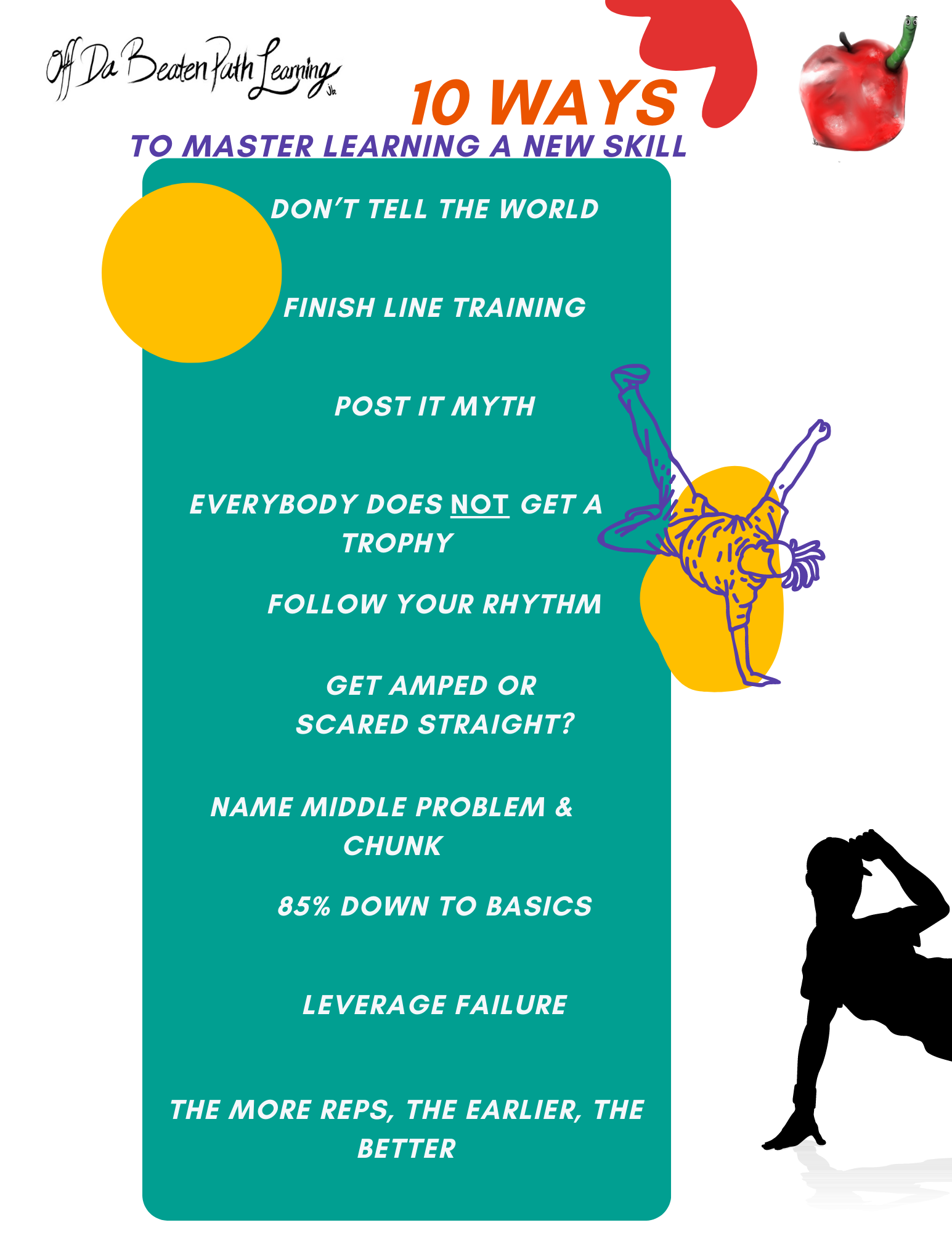10 Ways to Learn a New Skill
Resource on learning new skills, made custom for a learner, made by Dominique Paloma Bible, Founder, Off Da Beaten Path Learning LLC
Learning a new skill? I designed an infographic as a custom resource for a learner who is learning a new physical skill. It is mostly a distillation of information from Dr. Andrew Huberman, from his podcast episode on accomplishing goals. I highly recommend watching for the full context of information. Below are my notes on accomplishing goals and learning a new skill. If you find this helpful, reach out and let me know how you used this resource!
Don’t tell the world
Finish line training
Post it myth
Everybody does not get a trophy
Follow your rhythm
Get amped or scared straight
Name the middle problem and chunk
85% down to basics
Leverage failure
The more reps, the earlier on, the better
Don’t tell the world. This rule is about minding your business, and minding it well. What you pay attention to will grow. You have a goal, it’s lofty and important, and you don’t want to waste that energy on those who don’t need to know. Keep your goals on a “Need to Know Only” basis. If sharing isn’t immediately useful, don’t do it.
Finish line training. This is interesting. Did you know one way to sustain motivation within a practice period is to look at something, narrow your vision, and hold that for a minute? Essentially, if you can hold attention with your eyes, you can focus your attention with your brain. Makes sense. To keep your eye on the prize, literally look at the finish line. If you are learning a language and reading a lot of books, you’ll want to look at something which is reading distance. That’s your finish line. If you are learning to drive, look ahead at the road, that’s where you’ll hold your vision. Narrowed-focus, and make sure to blink.
Post it myth. So this one personally hurt me. Apparently, leaving post it notes stuck to your wall is going to accomplish bupkis because it’s too regular of a setting. Your brain will mush it into everything else that is so regular, that it gets taken for granted. (And then it goes unfinished, so we don’t want that.) If the post its are going to work, you need to interact with them, and keep your brain active and thinking on its feet, so to speak.
Everybody does not get a trophy. Love this. Intermittent reward. Random reward. If you always get a reward for every time you exert effort, you’ll start to care less.
Follow your rhythm. There are times after waking when we’re most focused. Follow that natural schedule as best you can. After waking, you will focus best after: 30 minutes. 3 hours. 11 hours.
Get amped or scared straight? This one is also cool. Before starting your practice of a new skill, check in with yourself about how motivated you are. Do this and really honestly gauge how much you want to show up. Use that data to determine your next move, as follows: If you are more than halfway motivated, picture success. Let the excitement of accomplishment pull you forward. If you are less than halfway motivated, picture failure. Scare the criminey-crickets out of yourself by really imagining what failure would look like. Not in a self-deprecating way, just in a realistic way to avoid that. Know-thy-enemy type of thing.
Name the middle problem and chunk. This may sound familiar: You start learning a new skill, get all excited, forget about it, and then return to it in a scramble to accomplish something by your original deadline. In other words, there is a tendency for learners to slump during the middle. Solution #1 is to simply face that, acknowledge it, name it. The middle of this experience will be more difficult, statistically speaking. Solution #2 is to chunk that part of your study plan into very easy-to-do pieces. Break it down so you can see it through.
85% down to basics. This one is about self-care and basic human maintenance. Hydrate, eat fresh foods, get protein, exercise, see sunlight, clean your body and your home, etc. If you are not working optimally, then your learning process won’t be sustainable either.
Leverage failure. If you’re going to fail, which you will because it’s inevitable, fail well. In other words, make meaning of your failures, really zero in on what is going wrong, and use that information carefully as a means of improvement.
The more reps, the earlier on, the better. Another insight related to failure: In the beginning, you will likely stumble a lot. That is okay. You want to stumble a lot at the start to strengthen brain wires associated with that task. By establishing a sort of reflex, from there, you can then refine those neurological connections to improve the quality of your practice.


